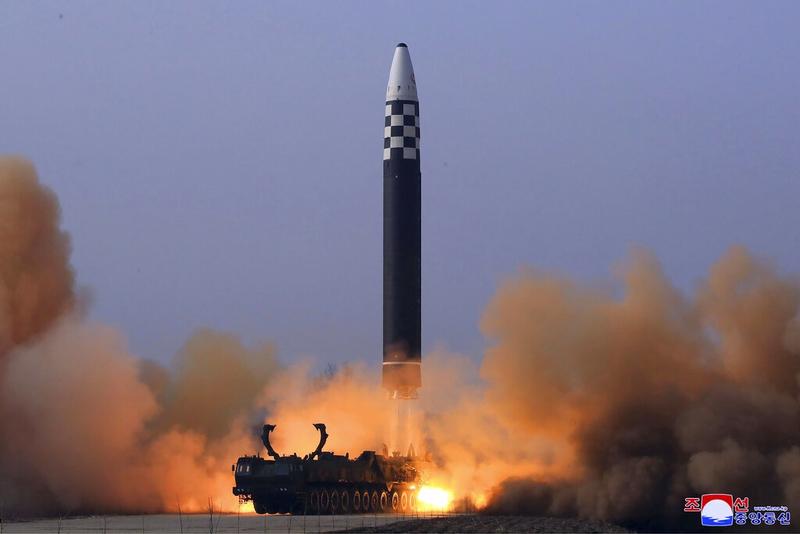 This photo distributed by the government of the Democratic People's Republic of Korea shows what it says is a test-fire of a Hwasong-17 intercontinental ballistic missile, at an undisclosed location in the DPRK on March 24, 2022.
(KOREAN CENTRAL NEWS AGENCY / KOREA NEWS SERVICE VIA AP)
This photo distributed by the government of the Democratic People's Republic of Korea shows what it says is a test-fire of a Hwasong-17 intercontinental ballistic missile, at an undisclosed location in the DPRK on March 24, 2022.
(KOREAN CENTRAL NEWS AGENCY / KOREA NEWS SERVICE VIA AP)
UNITED NATIONS - China on Friday called for restraint on the Korean Peninsula nuclear issue after the test launch of an intercontinental ballistic missile was conducted by the Democratic People's Republic of Korea the previous day.
ALSO READ: DPRK's Kim issues order for test-launch of new type ICBM
"Under the current circumstances, we call on the parties concerned to stay calm, exercise restraint, stay on the right track of dialogue and consultation, and avoid taking any action that may exacerbate the tensions and lead to miscalculations," China's permanent representative to the United Nations Zhang Jun told the Security Council meeting on the situation of the Korean Peninsula.
As the peninsula's next door neighbor, China has been consistent in advocating and promoting the peninsula's peace and stability, its de-nuclearization, and the approach of seeking a solution through dialogue and consultation
Zhang Jun, China's permanent representative to the United Nations
"As the peninsula's next door neighbor, China has been consistent in advocating and promoting the peninsula's peace and stability, its de-nuclearization, and the approach of seeking a solution through dialogue and consultation," Zhang said, adding that "we hope the United States and the DPRK will actively pursue dialogue and engagement in search of an effective solution to settle their differences."
Zhang said the direct parties to the peninsula issue, namely the United States and the DPRK, should re-engage in direct talks without delay.
"It is right and proper for the US side to show its goodwill, take actions that have practical relevance, and work harder to stabilize the situation, build mutual trust, and relaunch dialogue," the envoy noted.
He underscored that given the evolving situation, the international community should stick to prudence and reason on the peninsula issue, and play a positive, constructive role in bringing about a political settlement of the peninsula issue.
"No parties should take any action that would lead to greater tensions, and the Peninsula cannot afford the risk of any dramatic change, much less a reversal of the situation with dire consequences," said Zhang, noting that "what needs to happen now, as a matter of urgency, is for the parties concerned to actively seek a political way out of the impasse on the basis of existing understandings in light of the latest developments."
"China calls on the parties to put the greater good of peace and stability on the peninsula first, speak and act with caution, pursue dialogue and consultation, take the dual-track approach guided by the principle of moving forward in phases with synchronized steps, and work tirelessly to denuclearize the Peninsula and to build a peace mechanism thereon," said the ambassador.
READ MORE: ROK says DPRK fires projectile, believes it is ICBM test
He pointed out that the DPRK's legitimate concerns must be addressed and both the United States and the DPRK must resume direct talks as soon as possible.
"It is imperative to interpret and implement the Security Council resolutions concerning the DPRK in a comprehensive manner. These resolutions should be implemented comprehensively, completely and accurately," the envoy said.
"The fact that the peninsula issue is deadlocked is to some degree attributable to the absence of effective implementation of certain provisions therein. The parties concerned should take this issue seriously, and take practical actions rather than put one-sided emphasis on the sanctions provisions therein," he stressed.
Zhang underlined that the council should play a constructive role when it comes to the peninsula issue, adding that it should not stress the need for sanctions and pressurization to the exclusion of other considerations.
"It is in the common interest of all countries to safeguard the international nuclear non-proliferation regime. At this important juncture for the persistent and intractable nuclear issue on the Korean Peninsula, certain countries ignore the concerns of the international community and went ahead with their nuclear submarine cooperation, which poses a serious risk of nuclear proliferation," he said.


